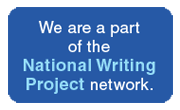Composing the White House
A big thank you to our friends at Wellstone Action! for inviting us to the White House to talk about education, literacy innovation, and achievement and a special recognition of the Thomas Hariott College of Arts and Sciences at East Carolina University who funded our work. Dr. Will Banks, Writing Program Director at ECU, and I, along with other representatives from both the Council of Writing Program Administrators and the National Writing Project, met in the East Wing this past Friday, October 7 during the Community Leader’s Briefing Series, listening to the administration’s education priorities and talking about our own work with writing, literacy and professional development in Eastern NC and across the country.
The White House Community Leader’s Briefing Series, an outreach of the Office of Public Engagement, brings local leaders to Washington to learn about the president’s agenda and speak with senior White House staff about how the administration’s initiatives and policies affect our work and our communities, and in this case, our teaching and our schools. Morning presentations in the Eisnehower Executive Office Building included economic updates, schilling for the American Jobs Act, and an overview of administration initiatives such as Joining Forces, a program that provides additional support to military families and Let’s Move, Mrs. Obama’s campaign to prioritize exercise and provide healthy, fresh food in low-income neighborhoods and communities. In addition, we were encouraged to review the website and submit profiles of our work to Champions of Change, a campaign that spotlights community leaders and innovative projects that “out-innovate, out-educate, and out-build the rest of the world.”
During the afternoon breakout session, our groups met with Department of Education (DOE) policy advisors to discuss the administration’s education policy, specifically the re-authorization of the Elementary and Secondary Education Act (ESEA), Common Core State Standards (CCSS) and Assessment, and state waivers which allow for more local control in school transformation and reform, and Sponsoring Effective Educator Development (SEED) grants that congress has set aside out of Title II funds for teacher training and development.
[To read the rest of Stephanie’s blog post about the White House visit, check out her blog, “Tales from the Nondescript.”]










